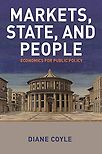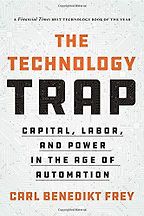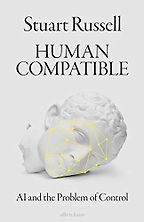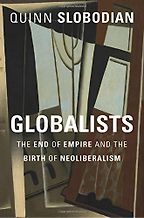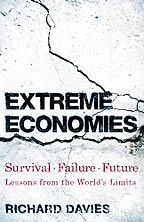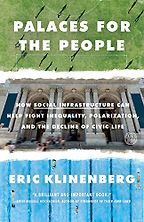We always start with a general overview, so let me ask: how has 2019 been as a year for economics books? I don’t want to be down on previous years, but I did find myself getting quite excited by quite a few of the books on your list.
I suppose a lot of the things that economists have been thinking about for a while have become of much wider interest recently, and that demand is creating a supply of terrific books. Even since I sent you the list of my top five books, there have been new books that have been making waves. For example, the latest book by Esther Duflo and Abhijit Banerjee, two of the winners of this year’s Nobel economics prize, Good Economics for Hard Times. Thomas Piketty also has a new book coming out [Capital and Ideology] about inequality that will arouse a huge amount of interest. The fact that there are so many great books is about the times we’re in, as well as the fact that there is some great economics being done.
Let’s focus on the books that did make your top five. We’re currently at the economics festival that you organize every year in Bristol, so let’s start with a book that’s written by tonight’s speaker, Carl Frey. He’s an economist at the Oxford Martin School, a multi-disciplinary research institute set up to find solutions “to the world’s most urgent challenges.” The book is called The Technology Trap and it’s about learning the lessons of history. Can you tell me a bit about the book and why you like it?
Carl’s work is about what the impact of this new wave of technology and automation is going to be on everybody’s jobs and standards of living. He does that by taking a historical perspective and looking at the Industrial Revolution. The fact is that for quite a long period there wasn’t any increase in average standards of living and indeed, as we know from literature, there was a period of great misery for lots of people as they moved from the countryside to work in the mills and so on.
The question he’s asking is, ‘Is it going to be the same this time? Is history going to repeat itself?’ and ‘Are there things we can try and think about in terms of policy that will stop history repeating itself?’ It has to be said that this is all quite uncertain, because although people fear what automation is going to do—that wave of robots coming and taking jobs—it hasn’t happened yet.
Does he have any convincing answers about what can be done?
That’s probably not the strongest part of the book, but that’s because there’s no simple solution, no silver bullet that can take on that challenge. We know from the waves of automation of the 1980s and 1990s that what we did then wasn’t particularly effective. A lot of the problems of the Rust Belt in the US and in the north of England, for example, are a result of the fact that we didn’t handle those job losses particularly well. Unemployment and poverty were embedded in those kinds of places and now we’re seeing the political backlash.
“We’ve got to the point where there’s very widespread questioning of the ways we’ve been doing things and how things have turned out”
The book underlines the urgency of dealing with this, but also shows that it’s really quite difficult to think about. How do you rearrange the whole of a society to stop the disruption that comes with technological innovation?
In the opening line of the preface Carl Frey writes, “Historians may wonder why we fail to learn from the past.” In the book, he goes right back to the invention of agriculture and looks at the whole of history. Do you think the past has lessons we can learn from it?
I wouldn’t go that far back, because the institutions and the government frameworks are too different, but you would hope that we can improve over time, that we can learn in some ways. We saw that that’s possible, actually, during the financial crisis. Central banks clearly had learned the lessons of the Great Depression.
Today, I think we can learn the lessons, not perhaps from the Industrial Revolution, but from the 1980s and 1990s. We need to think about things that have been allowed to atrophy, like job guarantees and a proper welfare state.
As you say, we’re familiar with the dispossessed of the Industrial Revolution because of literature, and Charles Dickens in particular. To think that we might be going through something similar is a real wake-up call. But is that true? Could it really get that bad again?
I don’t think it will get that bad. We start as a much richer society and with much more effective social and government institutions, so I certainly don’t think it will be directly comparable. Also, when you’re comparing any particular outcomes, you have to remember the counterfactual. Life as a poor person in the English countryside in 1800 was no picnic either.
One last thing I wanted to ask about The Technology Trap: Carl Frey talks about the losers from technological change being barriers to technological progress historically. Is that an important part of the argument?
I think it is, because that’s the politics of backlash that we see now. To the extent you think technology helps to explain inequality in the modern world—and I think it does—then, of course, it can be stopped. The moves towards protectionism you can see are part of that, because one of the things technology has done is create global supply chains and all the logistics that go along with that, including trade barriers coming down. If they go back up, that will reorganize production again.
Let’s go on to the next book on your list of best economics books of 2019, which is Human Compatible. It’s about artificial intelligence and it’s by computer scientist Stuart Russell, who is also the author of one of the widely used AI textbooks. Tell me why you chose this book.
I’ve been thinking a lot about AI and working with computer science colleagues to try and understand the implications for public policy, so I’ve read a lot of AI books. Actually, just as we were saying about economics books, there’s a whole clutch of AI books because, again, the interest is there. People want to understand what’s going on. Human Compatible is a really clearly written one. It explains enough about how AI works, but also what some of the challenges are.
The particular challenge the book focuses on is how to program AI systems so they do what we really want them to do, rather than just what we write down in the code that they then implement. It’s actually very difficult. Think about the effects of setting targets for public services, and how easily they got gamed. When you give a hospital a minimum amount of time before they admit people, they will do things like park patients in the waiting room or on trolleys so that the clock doesn’t start ticking too quickly. Or if you give an ambulance service a certain amount of time to get to patients, they will game it so they get there in time to meet their targets.
It’s the same with AI. If you set them an explicit objective—which you have to do because how else are you going to get them to do something—how do you stop them gaming things in that way and delivering something that you don’t really want?
Get the weekly Five Books newsletter
One example is image recognition. AIs are potentially really good at recognizing tumours and rogue cells, but they’re often trained on images of tumours where doctors have put little rulers in to show how big the tumour is. Some developers found that they had trained ruler recognition systems rather than tumour recognition systems.
You’ve just got to think very carefully about what objective you’re coding into the AI. So this book is about that problem, as well as a potential solution, which is making the system uncertain about what it is the humans really want. This is at a really early stage of research in the AI community, but it’s a very important question for policymakers who are thinking about using AI in public policy.
A lot of AI books seem to argue that if things go well, AI could be great, but if it goes badly, it could spell the end of the human race. It’s quite interesting to read a book by someone who obviously knows a lot about it, but is quite optimistic.
Yes, he doesn’t believe they’re going to kill all the humans to produce the maximum number of paper clips, to use the famous Nick Bostrom example. He’s not a pessimist of that kind. He’s more saying that if we’re not careful, we’ll get some adverse outcomes that we don’t really like.
Why is AI so important for public policy?
Because some of the areas where AI systems are being used are things like criminal justice, policing and making decisions about social care. The consequences of getting it wrong on people’s lives are just huge so we shouldn’t be making mistakes.
Okay, book no. 3 on your list is the Globalists, which is by Quinn Slobodian. It was first published in 2018, but the paperback is coming out soon. He’s a historian of Germany rather than an economist, I think, but the book is about neoliberalism.
Yes, it’s a historical book about the origins of what people have come to call ‘neoliberalism’, which I find a somewhat irritating as it’s a very vague term. Often it’s used to mean all of economics, which is just absurd, as if the most conservative free-market economist was the same as someone like Paul Krugman.
This book is about the philosophical origins of neoliberalism in 1930s Vienna and logical positivism and how it spread globally, particularly into Anglo-Saxon and American universities, and also about the way it underpinned the philosophy of globalization that we have seen take over the world since the 1980s.
It’s really interesting to understand that the ideas that we think of as ‘natural’ actually have very specific historic and cultural origins. They spread through actual social networks and institutions. The book therefore also offers insight into how you can change that public philosophy.
Is neoliberalism the idea that markets should be unfettered? Or let me put that question another way: does he give a definition of neoliberalism, because I’m never sure exactly what it means?
I don’t think neoliberalism has a universal definition. I’m much more persuaded by this account, which says, ‘there’s a historical school of thought that you can accurately call neoliberalism and here’s how it evolved.’
Obviously there is this idea of unfettered markets, which is an abstraction that doesn’t make any sense. I spent many years on the UK Competition Commission, whose aim is to make markets as competitive as possible. What you quickly learn is that every market has a particular set of institutional characteristics. They’re social institutions. Companies are social institutions. The idea that there is this magic free-market realm is an absurdity.
So this book is a corrective to that, because by looking at the history you can understand…
The motivations and how it came to be so influential.
So what were the motivations? In the book he talks about “militant globalism”.
The idea is that they were advocating globalization as a means of enabling companies to be unfettered by government policy within a particular nation. So the idea of globalization and its inevitability stopped national governments regulating and limiting the things that companies wanted to do. That’s the historical context in which he places it.
“I don’t know whether you can have economic growth with a shrinking population”
Because of the Depression, the demand for the government to intervene in the economy grew. You saw the New Deal in the United States and interventions elsewhere as governments responded to it. As a result, those who were on the side of big business became advocates of free movement of goods and capital globally, as a countervailing argument to government intervention at the national level.
So the next book in your list of the best economics books of 2019 is Extreme Economies by Richard Davies, which is a really interesting book. Tell me about it.
This book is a series of rip-roaring tales about what you might classify as ‘informal’ economies in different contexts and the way that some of them work really well and some of them work really badly. The compare and contrast gives you real insights into what perhaps makes a formal, official economy work very well or very badly.
Richard Davies spent many months travelling around the world to visit all these different places. For example, he goes to two refugee camps for Syrians, one of which is a thriving economy and the other of which isn’t, and looks at what the difference is between them.
I was also really gripped by the chapter on Angola, the prison in the southern United States, and how, despite the constraints on the inmates, they manage to make some kind of economy function that allows them to satisfy certain needs.
At beginning of the book, he explains that he’s taken the idea from science and engineering that you can learn from when things go badly wrong. So the book opens with a man who sees the tsunami coming in and loses everything. He also writes about Kinshasa in the Democratic Republic of Congo. It’s fascinating reading about all these places, but are there any takehomes that we can apply?
It’s in one sense not a very helpful takehome, but equally a very important one, which is that sometimes government is the solution and sometimes government is the problem. What that tells you is that it’s really hard to get government policies and regulations right. It isn’t the kind of takehome that you can go away and apply quickly. That’s a very good lesson for economists: that the specific, cultural and historical context really matters for the kinds of policies you might want to prescribe.
Another interesting place he visits is Akita, Japan. Does Japan have anything to teach us about how to deal with the challenge of an ageing population?
We’re heading into uncharted waters, because economic growth has always gone hand-in-hand with population growth. And, of course, there’s been per capita growth too. I don’t know whether you can have economic growth with a shrinking population. Modern economic growth theory suggests you can’t, because the role of people in spreading and sharing ideas is such an important driver of what we think of as growth. I find that quite a sobering chapter, because there’s nothing obvious you can do about it.
I would also say about Extreme Economies that it’s a great book for students as an insight into the interesting questions to ask about any economic environment, about how markets work and how policies work. It’s a great introduction.
We’re now at book no. 5 of your best economics books of 2019. This is Palaces for the People, which is by a sociologist, Eric Klinenberg. The title is clearly a reference to Andrew Carnegie and the libraries he funded, which he called palaces for the people. Tell me about this book and why you liked it.
I first discovered Eric Klinenberg’s work through a book he wrote about a Heat Wave in Chicago. He looked at what are called ‘excess death rates’—the extent to which the death rate is above normal—and how they differed in different parts of the city during a very severe heat wave and how different social structures in Hispanic and African-American families helped explain the difference. It’s a really impressive piece of work.
This is about what social scientists call ‘social capital’, so the social assets or strengths that any community has to draw on in delivering economic improvements or quality of life etc. It’s about libraries in particular, but also other social infrastructure that enables people to meet and understand each other and have safe and inviting ways to help each other. He talks about how these are being eroded through things like library closures or parks not being maintained, or just the design of public spaces in modern cities.
Five Books interviews are expensive to produce. If you're enjoying this interview, please support us by donating a small amount.
I think this book is really powerful, because in economics we talk all the time about social assets as important drivers of economic outcomes. So in economic development, it’s about economic institutions, in corporate finance it’s about the value of the brand and reputation. We know that these social dimensions are important, but we don’t think about them enough. This book makes a fantastic case for provision of this kind of social infrastructure.
Yes, because he says that it’s hard for this social capital to develop without any locations for it to take place.
It’s got to be embedded in particular places. The design of the building matters and how you get there, whether you can get on public transport. It all matters.
After reading the book I was really ready to go out and support the local library; you just feel that something’s got to be done. I had that with a lot of these books, actually, that they’re a bit of a call to action. You work in policy: do you feel, generally, that there’s consensus building about the need to combat inequality and how to set about doing so? Are you optimistic that changes are afoot?
Generally, I suppose I am. We’ve got to the point where there’s very widespread questioning of the ways we’ve been doing things and how things have turned out. That’s pretty evident. I don’t think we have got to the point of consensus about what to do about it, but at least people are talking about all these kinds of issues. We really have got away from, ‘We’ll just leave it to market forces to sort out.’ That really is dead in the water now.
You have a book coming out soon, Markets, State, and People: Economics for Public Policy. Who is it aimed at: is it a textbook for students doing a public policy course or is it a book all politicians should read?
Both of the above. It’s billed as a textbook and it’s built on a course that I developed myself and have been teaching for some years. But it’s not technical and I hope is well enough written that anybody could enjoy reading it. So students for sure—undergraduates or MPP students—but also anybody working in public policy or in politics. What I try to do is demonstrate that there are some problems and some circumstances in which there isn’t a single right answer about how you do things, and there are choices and trade-offs to be made.
Sometimes state ownership is the right way to go. Sometimes you want a market structure. Sometimes you want neither of those and you want to leave it to some kind of community structure or other sort of organization. We have loads of those: firms themselves, but also unions and mutual societies and playgroups and so on. There are a lot of self-organized entities.
“A lot of the problems of the Rust Belt in the US and in the north of England…are a result of the fact that we didn’t handle those job losses particularly well”
The book is trying to think through how you analyze the kinds of policy challenges that you face, to try to understand what to do about them. That might change at different periods of history or it might be different in different countries—or different sets of voters will just have different priorities. So it tries to be a very rounded book about how to select and implement public policies, while being really rooted in economic analysis.
Was there a gap in the market then, in terms of an economics textbook about that kind of decision-making?
There was nothing that I could use to teach from. There’s the traditional approach to public economics, which does some macroeconomic stabilization policy, so tax and spend and monetary policy, and then does a lot about tax design and tax structures. What I wanted to think about was how you organize production and distribution and there wasn’t a book that answered that.
You’re a co-director of the Bennett Institute of Public Policy at Cambridge University. Is it a bit like the Oxford Martin School, so focused on the challenges humanity faces in the future?
The mission our original donor has set us is researching ways to address inequality and sustainability. So that’s our focus, but it’s a similar research-oriented, challenge-focused, interdisciplinary policy institute. As important civic institutions, universities need to start addressing big societal problems across disciplinary boundaries and engaging with the public and policymakers.
Five Books aims to keep its book recommendations and interviews up to date. If you are the interviewee and would like to update your choice of books (or even just what you say about them) please email us at [email protected]

